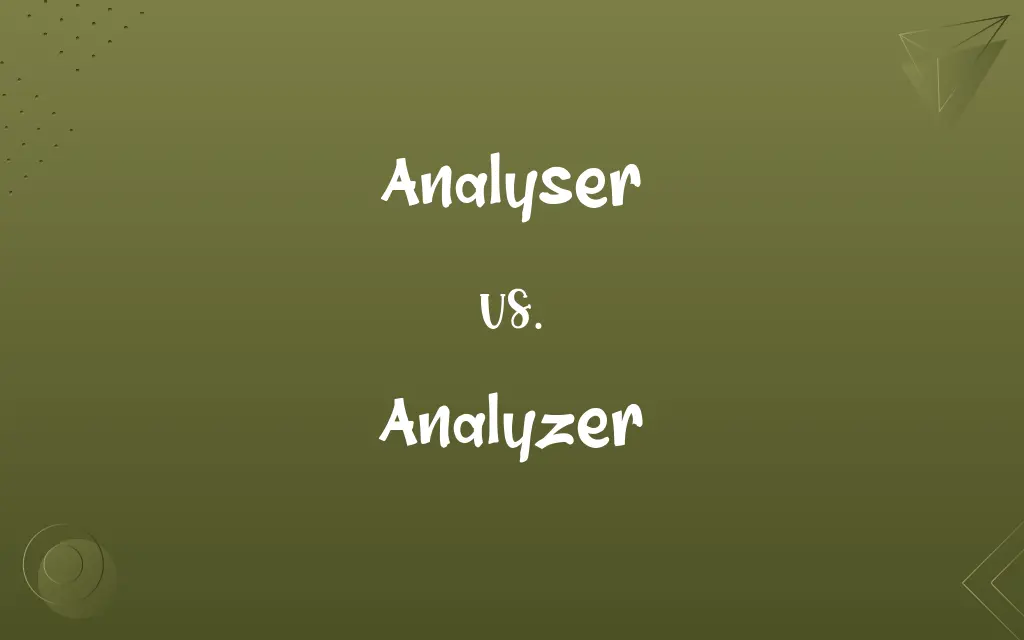Analyser vs. Analyzer: Know the Difference

By Shumaila Saeed & Hifza Nasir || Updated on March 3, 2024
Analyser is the British English spelling emphasizing chemical analysis, whereas Analyzer is the American variant, often used in technical contexts.

Key Differences
Analyser, as used in British English, primarily refers to a device or tool used for analysis, especially in scientific and technical fields. Whereas, Analyzer, the American English spelling, carries the same meaning but is more commonly used across various industries in the US, including technology and healthcare.
Shumaila Saeed
Mar 03, 2024
In literature and formal writing, "analyser" reflects the British preference for 's' in words where 'z' appears in American English. This distinction aligns with other spelling variations like "realise" vs. "realize". On the other hand, "analyzer" conforms to the American spelling rules, which often favor 'z' over 's' in words to reflect the pronunciation more closely.
Shumaila Saeed
Mar 03, 2024
The choice between "analyser" and "analyzer" can also indicate the intended audience or the origin of the research. British publications tend to use "analyser," emphasizing the global diversity of English spelling conventions. Meanwhile, American publications opt for "analyzer," which can influence terminology in international contexts, given the extensive reach of American research and technology.
Shumaila Saeed
Mar 03, 2024
In the field of software and programming, the spelling "analyzer" is predominantly used worldwide, reflecting the global influence of American English in the tech industry. This uniformity helps in standardizing terms across documentation and coding languages, making "analyzer" more prevalent in international software development conversations.
Shumaila Saeed
Mar 03, 2024
Although both spellings are correct, depending on the variant of English being used, the choice between "analyser" and "analyzer" can subtly affect the perception of text, suggesting either a British or American affiliation. This distinction, while minor, contributes to the rich tapestry of English language variations and preferences across different regions and fields.
Shumaila Saeed
Mar 03, 2024
ADVERTISEMENT
Comparison Chart
Usage
Preferred in British English, especially in scientific contexts
Predominantly used in American English and widely in technical fields
Hifza Nasir
Mar 03, 2024
Literature and Writing
Often found in British literature and formal writings
Common in American literature and technical documents
Shumaila Saeed
Mar 03, 2024
Academic Publications
Used in research and publications targeting a British or Commonwealth audience
Used in American and international publications, reflecting US influence
Hifza Nasir
Mar 03, 2024
Technology and Software
Less common in global software terminology
Standard term in software and programming, regardless of region
Shumaila Saeed
Mar 03, 2024
ADVERTISEMENT
Analyser and Analyzer Definitions
Analyser
A person who conducts analysis.
The data analyser presented their findings to the team.
Shumaila Saeed
Mar 03, 2024
Analyzer
Equipment used to examine components or features.
The laboratory analyzer quickly identified the chemical makeup.
Shumaila Saeed
Mar 03, 2024
Analyser
A device for determining the constituents of a substance.
The lab used an analyser to test the water quality.
Shumaila Saeed
Mar 03, 2024
Analyzer
A professional who performs analytical work.
The market analyzer predicted trends with surprising accuracy.
Shumaila Saeed
Mar 03, 2024
Analyser
In computing. a program that examines data.
The software included a built-in analyser for user metrics.
Dua Fatima
Mar 03, 2024
ADVERTISEMENT
Analyzer
A critical examiner of a concept or text.
The literary analyzer dissected the themes of the novel.
Shumaila Saeed
Mar 03, 2024
Analyser
In linguistics. a tool for examining sentence structure.
The syntactic analyser helps linguists study language patterns.
Dua Fatima
Mar 03, 2024
Analyzer
A software tool for data examination.
The network analyzer helps identify vulnerabilities.
Shumaila Saeed
Mar 03, 2024
Analyser
In psychology. one who interprets behavior or dreams.
The dream analyser offered insights into unconscious meanings.
Hifza Nasir
Mar 03, 2024
Analyzer
A device in electronics for signal analysis.
The spectrum analyzer is essential for frequency analysis.
Shumaila Saeed
Mar 03, 2024
Analyzer
To examine methodically by separating into parts and studying their interrelations.
Shumaila Saeed
Oct 19, 2023
Analyzer
The part of a polariscope which receives the light after polarization, and exhibits its properties.
Shumaila Saeed
Oct 19, 2023
Repeatedly Asked Queries
Can I use "analyser" in American English documents?
While you can use "analyser" in American English documents, it's less common and might be marked as a spelling error or considered a Britishism. It's best to match the spelling to the document's dialect. e.g., For consistency, use "analyzer" in American English documents.
Shumaila Saeed
Mar 03, 2024
Are "analyser" and "analyzer" interchangeable in scientific contexts?
Yes, in scientific contexts, both terms are interchangeable, but the choice of spelling should be consistent with the rest of the document's English dialect. e.g., The gas analyser (UK) results were consistent with those from the gas analyzer (US) in the study.
Hifza Nasir
Mar 03, 2024
Is there any difference in pronunciation between "analyser" and "analyzer"?
The pronunciation difference is minimal and often indistinguishable, focusing more on the accent and dialectal inflections of the speaker rather than the word itself. e.g., Whether you say analyser or analyzer, the pronunciation is largely the same across English dialects.
Shumaila Saeed
Mar 03, 2024
Do "analyser" and "analyzer" have the same technical meanings?
Yes, in technical contexts, both terms have the same meanings and are used to refer to devices or tools that carry out analysis. The context and dialect determine the preferred spelling. e.g., The chemical analyzer (US) works similarly to the chemical analyser (UK).
Dua Fatima
Mar 03, 2024
Can both "analyser" and "analyzer" refer to software tools?
Yes, both terms can refer to software tools designed for analyzing data or processes, with the spelling variation depending on the English dialect used. e.g., The data analyser (UK) tool was as effective as the data analyzer (US) in processing the information.
Shumaila Saeed
Mar 03, 2024
How do publications choose between "analyser" and "analyzer"?
Publications choose based on their target audience's dialect or the standard dialect of the publication itself, whether it's British or American English. e.g., British journals prefer "spectrophotometric analyser," while American journals use "spectrophotometric analyzer."
Shumaila Saeed
Mar 03, 2024
Are there any contexts where one spelling is preferred over the other?
The preference usually aligns with the regional English dialect: "analyser" in British English contexts and "analyzer" in American English contexts, without a specific context favoring one spelling. e.g., UK-based companies use "colour analyser," while US companies use "color analyzer."
Hifza Nasir
Mar 03, 2024
What is the difference between "analyser" and "analyzer"?
The difference is primarily in spelling: "analyser" is the British English spelling, while "analyzer" is the American English spelling. Both terms refer to a person or device that analyzes. e.g., The analyser (UK) detected impurities in the sample, just as the analyzer (US) did.
Hifza Nasir
Mar 03, 2024
In academic writing, how do I decide which spelling to use?
In academic writing, the choice depends on the style guide being followed or the institution's preference, often dictated by British or American English standards. e.g., If your university prefers British English, use "analyser" in your thesis.
Shumaila Saeed
Mar 03, 2024
How do international companies decide between "analyser" and "analyzer"?
International companies often choose the spelling that best fits the primary audience of their products or services, or they might offer variations based on the regional dialects of their international market. e.g., The product manual was available with both "colour analyser" and "color analyzer" spellings.
Shumaila Saeed
Mar 03, 2024
Share this page
Link for your blog / website
HTML
Link to share via messenger
About Author
Written by
Shumaila SaeedShumaila Saeed, an expert content creator with 6 years of experience, specializes in distilling complex topics into easily digestible comparisons, shining a light on the nuances that both inform and educate readers with clarity and accuracy.
Co-written by
Hifza Nasir








































































